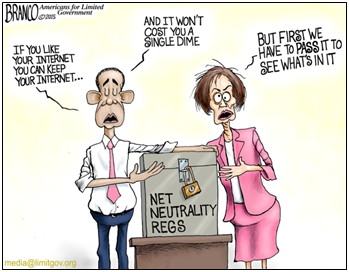“Why even have a Congress?”
That was Americans for Limited Government President Rick Manning’s question on the Federal Communications Commission’s (FCC) 3-2 vote in favor of new so-called “net neutrality” regulations.
The final rulemaking, the text of which has not been released yet, will include “reclassification of broadband Internet access as a telecommunications service under Title II of the Communications Act,” according to the agency’s press statement.
Under the 1996 Telecommunications Act, Internet service providers were exempted from being treated under Title II of the Communications Act of 1934 as common carriers. Instead, they were be treated as exempt “information services” providers by the FCC in an initial 2002 determination.
Now, the FCC has done a complete 180, saying that, yes they are common carriers.
“This is a dysfunctional regulatory precedent where an agency can simply change its interpretation of law depending on the partisan composition of the board,” Manning said.
The change came after President Barack Obama on November 10 urged the agency to make the change: “I believe the FCC should reclassify consumer broadband service under Title II of the Telecommunications Act.”
Obama added, “The Federal Communications Commission is an independent agency, and ultimately this decision is theirs alone.”
No, not Congress, says the President. The agency gets to decide what the law is.
“That is not the rule of law, it is rule by executive decree,” Manning commented, adding, “Whatever the merits of ‘net neutrality,’ the fact is that this entire process has been designed to avert the traditional, constitutional lawmaking process.”
A prior attempt to implement the rulemaking had been squashed by the D.C. Circuit Court of Appeals in January. Undoubtedly, the new regulation will be on its way to court, too.
Sure to come up is a basic question, namely, can the FCC just change its mind? It initially determined in 2002 that broadband was not covered under Title II, and in 2015 they say it is covered.
So, are broadband Internet providers like Verizon common carriers because the law says so, or because the agency says so?
In 2005, the Supreme Court said that the FCC’s original classification as an “information services” provider exempt from Title II common carrier restrictions was “a permissible reading of the Communications Act.”
Under Chevron U.S.A., Inc. v. Natural Resources Defense Council, Inc. (1984), the court decided “[I]f the statute is silent or ambiguous with respect to the specific question, the issue for the court is whether the agency’s answer is based on a permissible construction of the statute.”
Meaning, the Supreme Court ruled the agency could treat them as “information services” providers, not that now reclassifying them as common carriers would also be permissible.
And, depending on how it was done and what the facts in the case were, it very well may not be, the Heartland Institute’s Randolph May recently noted, “the Commission will need to show, as a factual matter, from a functional standpoint and from the consumer’s perspective, why its earlier technical analysis concerning the integrated nature of Internet service — that is, the inseparability of the transmission and information services components — is no longer ‘operative.’”
Meaning, there is no guarantee the FCC’s attempts to implement “net neutrality” will ever pass judicial muster.
On that count, the FCC statement claims to have met the requirements previously laid out by the courts: “The Order finds that the nature of broadband Internet access service has not only changed since that initial classification decision, but that broadband providers have even more incentives to interfere with Internet openness today.”
And yet, deference under Chevron is not a carte blanche for an agency to do whatever it pleases. The facts matter. And the devil will be in the details of the rule once it is finally released.
If courts ultimately rule that the agency cannot just arbitrarily change what the law means, net neutrality advocates may find themselves wishing they had just gone to Congress in the first place. But, if they happen to rule that agencies can indeed make the rules up as they go along, everyone else may be wondering why indeed it is we even have a Congress any more.
Robert Romano is the senior editor of Americans for Limited Government.







